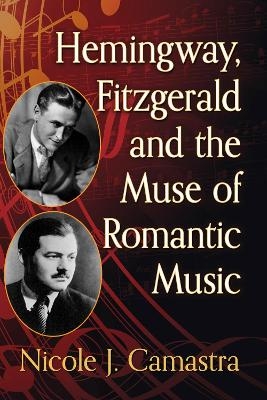
Hemingway, Fitzgerald and the Muse of Romantic Music
Seiten
2023
McFarland & Co Inc (Verlag)
978-1-4766-9016-2 (ISBN)
McFarland & Co Inc (Verlag)
978-1-4766-9016-2 (ISBN)
Considers how Romantic music inspired Hemigway’s and Fitgerlad’s craft and distinguished their work through the pivotal juncture of the early to mid-1930s, when each man faced an artistic crisis of conscience.
Both Ernest Hemingway and F. Scott Fitzgerald grew up in the Midwest and were strongly influenced by Romantic music, anchored by the aesthetic tastes of the German immigrants who settled across that region. Hemingway's ear for form and Fitzgerald's penchant for lyricism stem from early and frequent exposure to such masters as Johannes Brahms and Franz Schubert. Nostalgia is typically associated with romanticism, and the acoustic longing found in Hemingway and Fitzgerald's fiction resonates with it, characterized in the narrative voices in Hemingway's Winner Take Nothing, Fitzgerald's Tender Is the Night, and other of their fiction from the early thirties. Understanding that each writer has his own kind of musical biography charts new ways to read material we already think we know. Reading their work within a musico-historical context means acknowledging it as an extension of the 19th century; it means reading them as Romantic Modernists.
This work reads each author's prose musically, considering how Romantic music inspired their craft and distinguished their work through the pivotal juncture of the early to mid-1930s, when each man faced an artistic crisis of conscience. Initial chapters provide background information in music history. Following chapters focus on how the life of each author was shaped by music and how they worked with specific influences that grew out of steady interactions with it, evidence of which is found in archival documents and collections.
Both Ernest Hemingway and F. Scott Fitzgerald grew up in the Midwest and were strongly influenced by Romantic music, anchored by the aesthetic tastes of the German immigrants who settled across that region. Hemingway's ear for form and Fitzgerald's penchant for lyricism stem from early and frequent exposure to such masters as Johannes Brahms and Franz Schubert. Nostalgia is typically associated with romanticism, and the acoustic longing found in Hemingway and Fitzgerald's fiction resonates with it, characterized in the narrative voices in Hemingway's Winner Take Nothing, Fitzgerald's Tender Is the Night, and other of their fiction from the early thirties. Understanding that each writer has his own kind of musical biography charts new ways to read material we already think we know. Reading their work within a musico-historical context means acknowledging it as an extension of the 19th century; it means reading them as Romantic Modernists.
This work reads each author's prose musically, considering how Romantic music inspired their craft and distinguished their work through the pivotal juncture of the early to mid-1930s, when each man faced an artistic crisis of conscience. Initial chapters provide background information in music history. Following chapters focus on how the life of each author was shaped by music and how they worked with specific influences that grew out of steady interactions with it, evidence of which is found in archival documents and collections.
A former cellist, Nicole J. Camastra holds a Ph.D. in American literature from the University of Georgia and serves as the director of studies and English department chair at The O’Neal School in North Carolina. She is the author of several essays on American literature.
Table of Contents
Preface
Introduction: Romantic Modernists
1. Musical Romanticism
2. Ernest Hemingway Developing Variations
3. An Étude: Winner Take Nothing
4. Magnum Opus: The Polyphony of Prose in “The Snows of Kilimanjaro”
5. F. Scott Fitzgerald, Prince of Song
6. Art Song: Tender Is the Night
7. Swan Song: Romantic Pathos and Autobiography in “I’d Die for You” and Other Late Work
8. Recapitulation
Coda
Glossary
Chapter Notes
Bibliography
Index
| Erscheinungsdatum | 03.01.2024 |
|---|---|
| Zusatzinfo | glossary, notes, bibliography, index |
| Verlagsort | Jefferson, NC |
| Sprache | englisch |
| Maße | 152 x 229 mm |
| Gewicht | 272 g |
| Themenwelt | Kunst / Musik / Theater ► Musik |
| Geisteswissenschaften ► Geschichte | |
| Geisteswissenschaften ► Sprach- / Literaturwissenschaft ► Anglistik / Amerikanistik | |
| Geisteswissenschaften ► Sprach- / Literaturwissenschaft ► Literaturwissenschaft | |
| ISBN-10 | 1-4766-9016-2 / 1476690162 |
| ISBN-13 | 978-1-4766-9016-2 / 9781476690162 |
| Zustand | Neuware |
| Informationen gemäß Produktsicherheitsverordnung (GPSR) | |
| Haben Sie eine Frage zum Produkt? |
Mehr entdecken
aus dem Bereich
aus dem Bereich
Poetik eines sozialen Urteils
Buch | Hardcover (2023)
De Gruyter (Verlag)
CHF 83,90
Buch | Softcover (2024)
belleville (Verlag)
CHF 27,95


